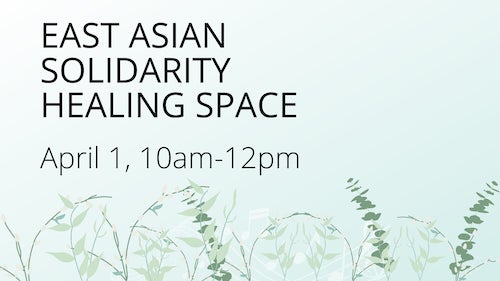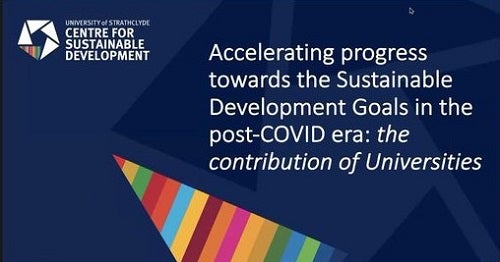Editor:
Brandon Sweet
University Communications
bulletin@uwaterloo.ca
University provides update on outbreak at UWP
A message from Kate Windsor, director, Safety Office.
On Wednesday, March 24, Region of Waterloo public health informed the University that five people who live on or have visited our campus tested positive for COVID-19.
Three of the people who tested positive currently reside in residence buildings at University of Waterloo Place on campus. Two others live in off-campus housing. As a result, Region of Waterloo public health has declared an outbreak at University of Waterloo Place.
Public health officials have been in touch with all high-risk contacts of the affected individuals. If you do not hear from public health officials, you should continue to self-monitor for symptoms of COVID-19 and seek testing if needed.
We are extremely disappointed that the cause of this outbreak appears to be a result of students ignoring our protocols for social safety.
University of Waterloo has robust protocols to manage COVID-19 cases on campus and in residence, including prohibiting visitors. Our Campus Housing team developed the procedures in consultation with public health and the Safety Office to protect the safety of our community. We maintain cleaning and disinfection that exceeds public health requirements. These protocols are effectively only if our students and employees follow protocols for social safety.
Avoid gatherings and stay safe
This outbreak is another opportunity to remind our community that every student and employee has an important part to play in limiting the risk of COVID-19. It is up to everyone to follow public health guidance and to respect each other as we share the space on our campus.
Public health advises everyone in Waterloo region to:
- Avoid all social gatherings with anyone not in your immediate household
- Limit non-essential trips outside your home (e.g. work, school, getting food)
- Practice physical distancing
- Wear a face covering
- Wash your hands often
- Avoid enclosed, poorly ventilated spaces and crowded places
- Stay home when you are sick and seek testing
Students in residences can get support
Residents who are experiencing symptoms, are concerned about exposure, have been identified as a high-risk contact, or have received advice to self-isolate can email reslifeteam@uwaterloo.ca for support.
COVID-19 testing is available for University students, employees, postdocs and family members living in the same household. To book a test, please use the online registration form.
We take the privacy of individuals extremely seriously. In reporting on positive cases, the University will protect the private health information of individuals. You should check our disclosure protocol for what to do if someone reveals to you that they have tested positive for COVID-19.
Equity Office to host East Asian Solidarity healing space

A message from the Equity Office.
All University of Waterloo students, faculty and staff of East Asian and South East Asian heritage are invited to a solidarity and healing space. The Equity Office is offering this space in the aftermath of the Atlanta murders and through the rise of anti-Asian hate brought forth through COVID-19.
Racism against East Asian and South East Asian people is often unheard, unseen, and unaddressed. You are invited to share your experiences, grief, anger, and pain in a listening and supportive environment. We will talk about how we can set personal boundaries to care for ourselves and those around us. When the narrative of white supremacy and capitalism pit different racial and ethnic groups against each other, how can we build solidarity on campus that is rooted in antiracism that challenges white supremacy? We will go through some free writing activities which you can share anonymously on a group board. We will discuss what next steps we’d like to see on campus and how we can continue to stay in community. The last thirty minutes will be a performance by Janice Jo Lee, who will share songs and poems to decompress and close in a good way.
The virtual Healing Space will take place on Thursday, April 1 from 10:00 a.m. to 12:00 noon. Registration is required. Please note this Healing Space is available to University of Waterloo students, faculty and staff of East Asian and South East Asian heritage.
The talk of the Library Town Hall

By Meghan Whitfield.
Yesterday the Library held an engaging Town Hall discussion on its Strategic Plan 2020-2025. Nearly 100 participants gathered virtually to get a behind-the-curtain look at how the Library operates and its ever-critical role in teaching, learning, research and the UWaterloo journey.
Moderated by Beyond the Bulletin Podcast co-host Pamela Smyth, the event featured special guests James Rush, vice president academic & provost, and Bruce Muirhead, associate vice president, research oversight and analysis. University Librarian Beth Namachchivaya followed with an informative presentation and dynamic conversation about the Library, its strategic goals, and the active work currently taking place. Questions from participants touched on a number of areas including the pandemic’s effect on library services, infrastructure improvements, and the rising costs of scholarly journals and books.
This event highlighted the unifying force of the Library, often referred to as the heart of the campus, across disciplines and across the University.
If you missed the live event, you can access the recording online. Answers to pre-submitted questions will be posted on the event website.
Waterloo partners with University of Strathclyde and others to host global SDG webinar

University partnerships make important contributions to advancing the United Nations Sustainable Development Goals (SDGs). This was the main message of a global webinar hosted by the University of Waterloo on March 2, 2021.
Invited by the UK's University of Strathclyde to contribute to the ‘Accelerating progress towards the Sustainable Development Goals in the post-COVID era: the contribution of Universities’ webinar series, Waterloo’s session was entitled ‘University partnerships to advance the SDGs: local, national, and international examples.’ Other webinars in the series were led by KTH Royal Institute of Technology (Sweden), the University of Stellenbosch (South Africa), and Peking University (China).
“The webinar series has been designed to showcase the valuable and integral role that universities play in attaining the SDGs across the globe in both the higher and lower income countries, and we are delighted to be working with outstanding partners such as the University of Waterloo to learn from their world leading programmes and their excellent national and global partnerships in this area,” said Dr. Tracy Morse, head of the Centre for Sustainable Development, University of Strathclyde.
Different types of partnerships, to include entrepreneurial, community, youth and educational, were examined across various scales, by four speakers, who also described and reflected on various partnership activities and addressed questions from the global audience.
Tania Del Matto, director of GreenHouse at St. Paul’s University College, discussed initiatives where the organization empowered, supported and scaled partnerships to encourage youth-led innovations.
“We continue to build partnerships that provide students with the opportunity to engage in interdisciplinary collaboration nationally and globally,” Del Matto said, while speaking about initiatives created by GreenHouse.
Dr. Paul Parker, professor, Faculty of Environment, and co-founder/director, Reep Green Solutions, reviewed the impact that an environmental charity, incubated at UWaterloo, has had in the community for more than 20 years. Dr. Parker also emphasized how partnership diversity helps to build strength and resilience.
“Our partnerships gave us the strength to overcome funding and program shocks and enabled us to deliver results,” he said. “Even when others were being closed down, we continued to move towards achieving the SDGs.”
Nidhu Jagoda, national youth coordinator, Sustainable Development Solutions Network (SDSN) Canada; and Master of Climate Change student, introduced SDSN Canada and SDSN Youth, which, she said, empowers youth globally to create sustainable development solutions.
“At a national level, we want to make sure that youth in our network have the opportunity to collaborate with external organizations working in the same space, and that is really what is at the core of our national initiatives,” Nidhu said while underscoring the importance of partnerships for youth engagement.
Dr. Ian Rowlands, associate vice-president, international, and professor in the Faculty of Environment, who chaired the webinar, outlined ways in which universities partner with others to advance the SDGs. He emphasised different levels of partnerships, including through individual members’ connections (students, staff, and faculty), various university units and institutional-level engagements.
“Ensuring equitable partnerships, measuring the impact of partnerships, and executing post-pandemic hybrid approaches, including virtual internationalization and the localization of international education, are some prominent themes for future consideration,” he said.
As UWaterloo continues to advance the SDGs, engagement with valued partners like the University of Strathclyde, and with individuals and groups around the world will remain a priority. Through ‘partnerships for the goals’, action for people, planet, and prosperity can continue.
The Winter 2021 issue of the IST newsletter is now online

A message from Information Systems & Technology (IST).
The winter 2021 issue of the IST Newsletter is now available. Read about the Office 365 change management program, see the latest WCMS 3 project updates, learn how to protect yourself against zoom-bombing, and learn more about some of the projects we're working on right now:
- Significant upgrades for Quest;
- Moving to SharePoint Online;
- Migrating N: drives to OneDrive;
- Mass Email Management; and more.
Friday's notes
The Waterloo Undergraduate Student Association (WUSA) has undertaken a review of its student-run services, and part of that review includes a survey for Waterloo students asking them which services they have accessed and what their experience was when they did so. The student survey is up and running with a deadline of Wednesday, March 31.
Here's the latest Nutrition Month "Myth vs. Fact" supplied by Health Services Dietitian Sandra Ace:
Myth: Calcium supplements cause heart disease.
Fact: Most scientific evidence indicates that neither calcium from food nor supplements causes heart disease in healthy adults.
There has been controversy about this topic over the past decade, with some prior studies concluding that taking calcium supplements increases heart disease risk while others have not. Dietitians of Canada PEN® Practice-Based Evidence in Nutrition examined this systematic review and meta-analysis which concluded that calcium from either diet or supplements, when taken at levels within the tolerable upper intake level (2000 to 2500 mg per day), was not associated with cardiovascular disease risk in healthy adults. This was an extensive analysis of four randomized control trials with more than 44,000 participants (mainly postmenopausal women) and 27 observational studies of more than 1.3 million men and women.
There has been a downward trend in both dietary calcium intake and the use of calcium supplements in Canada. Calcium is an important nutrient that is involved in nearly all the body’s vital functions, including hormone production, nerve transmission, muscle contraction and regulation of heartbeat. Getting enough calcium keeps bones healthy and reduces risk of fracture. Most adults get enough by eating a variety of foods as recommended by Canada’s Food Guide. If you don’t consume two servings of dairy products like milk or yogurt or calcium fortified milk alternatives like soy beverage most days, include foods from this list to ensure you’re getting enough calcium from other foods. Dark green leafy vegetables (like kale, bok choy, collard greens, Swiss chard and spinach), tofu, dried beans and canned salmon with bones are just a few examples of calcium rich non-dairy foods. Calcium-rich foods seem to be protective against heart disease. Getting your calcium from foods instead of supplements has an advantage because foods provide other nutrients, too.
If you are concerned that you don’t get enough calcium in your diet or are considering taking a calcium supplement, you can learn more here. Get advice from your healthcare provider or a registered dietitian about whether you need extra calcium and how much you should take. Should you choose to take a supplement, also consider the amount of calcium you get in your diet and make sure you do not exceed the recommended amount.
Beyond the Bulletin Podcast Episode 82

The latest episode of the Beyond the Bulletin Podcast is now live. When the pandemic first hit, our colleagues at Co-operative and Experiential Education sprang into action to support co-op students in new and inventive ways, and as Associate Provost Norah McRae tells us, they’re still innovating. There is a plan to deliver more in-person learning, work and research on campus in the fall. We tell you the winners of two different teaching awards. And Plant Operations launches a new portal for work requests.
Link of the day
When and Where to get support
Students can visit the Student Success Office online for supports including academic development, international student resources, leadership development, exchange and study abroad, and opportunities to get involved.
Instructors can visit the Keep Learning website to get support on adapting their teaching and learning plans for an online environment.
Updated Course templates are now available within your course in LEARN to help you build and edit your content and assignment pages quickly.
The following workshops, webinars, and events are offered by the KL team (CTE, CEL, ITMS, LIB):
Independent Remote Course Design Essentials. Self-directed, continuous self-enrollment course in LEARN.
Integrative and Experiential Learning Session (CTE7700), Wednesday, March 31, 2:00 p.m. to 3:30 p.m.
NEW - Introduction to PebblePlus (CTE7527), Wednesday, April 7, 1:00 p.m. to 3:00 p.m.
Employees can access resources to help them work remotely, including managing University records and privacy of personal information. Here are some tips for staying healthy while working from home.
Stay informed about COVID cases on campus by consulting the COVID case tracker.
Whether you’re a student or faculty member, the Writing and Communication Centrehas virtual services and programs to help you with all of your academic writing needs. This term we have added evening and weekend one-to-one appointments with our peer tutors, and our NEW one-to-one workshops, where you can learn the content directly from one of our writing advisors.
- Undergraduates: Work with us to brainstorm, draft, revise, and polish your assignments in one-to-one appointments. Ask questions and learn writing tips at our Instagram Live Q&A sessions, and beat isolation while improving your writing skills at the weekly PJ-friendly writing groups.
- Graduates: Meet with our advisors in one-to-one appointments. Join the online writing community at the Virtual Writing Cafés, learn how to present your work at Speak Like a Scholar, or get moving on your dissertation at Dissertation Boot Camp.
- Faculty and Instructors: Request custom workshops for your courses, join the Waterloo writing community at the Virtual Writing Cafés, or make progress on your article, book, or chapter in one-to-one meetings with our faculty specialist.
Co-op students can get help finding a job and find supports to successfully work remotely, develop new skills, access wellness and career information, and contact a co-op or career advisor.
The Centre for Career Action assists undergraduates, graduate students, postdocs, staff, faculty, and alumni through navigating career services that are right for them. You can attend a one-on-one appointment or same day drop-in session at the CCA for assistance with cover letter writing, career planning and much more. You can also book an appointment online or visit our Live Chat to connect with our Client Support Team. The CCA is here to help you.
If you feel overwhelmed or anxious and need to talk to somebody, please contact the University’s Campus Wellness services, either Health Services or Counselling Services. You can also contact the University's Centre for Mental Health Research and Treatment. Good2Talk is a post-secondary student helpline available to all students.
The Library has published a resource guide on how to avoid information overload.
The Faculty Association of the University of Waterloo (FAUW) continues to advocate for its members. Check out the FAUW blog for more information.
The University of Waterloo Staff Association (UWSA) continues to advocate for its members. Check out the UWSA blog for more information.
The Indigenous Initiatives Office is a central hub that provides guidance, support, and resources to all Indigenous and non-Indigenous campus community members and oversees the university Indigenization strategy.
The Waterloo Indigenous Student Centre, based at St. Paul’s University College, provides support and resources for Indigenous students, and educational outreach programs for the broader community, including lectures, and events.
WUSA supports for students:
Peer support (Visit https://wusa.ca/peersupport to book an appointment):
- MATES – Available Monday to Friday, 10:30 a.m. to 9:30 p.m.; Saturday and Sunday, 10:30 a.m. to 5:30 p.m. (online only)
- Support sessions available in the following languages: Cantonese, English, Hindi, Mandarin, Portuguese, Punjabi, Spanish, and Urdu.
- Glow Centre – Available Monday to Friday, 4:00 p.m. to 8:00 p.m. (online only)
- RAISE – Available Monday to Friday – Varied hours (online only)
- Women’s Centre – Available Monday to Friday, 2:00 p.m. to 5:00 p.m. (online only)
Bike Centre – Will be reopening soon.
Campus Response Team, ICSN, Off Campus Community and Co-op Connection all available online. Check https://wusa.ca for more details.
Food Support Service food hampers are currently available from the Turnkey Desk on weekdays from 7:30 a.m. to 7:00 p.m. in the Student Life Centre. If you have any questions please email us at foodsupport@wusa.ca.
Centre for Academic Policy Support - CAPS is here to assist Waterloo undergraduates throughout their experience in navigating academic policy in the instances of filing petitions, grievances and appeals. Please contact them at caps@wusa.ca. More information is available.
WUSA Commissioners who can help in a variety of areas that students may be experiencing during this time:
- Equity – equity@wusa.ca
- Co-op and Experiential Affairs – coop.affairs@wusa.ca
WUSA Student Legal Protection Program- Seeking legal counsel can be intimidating, especially if it’s your first time facing a legal issue. The legal assistance helpline provides quick access to legal advice in any area of law, including criminal. Just call 1-833-202-4571.
Empower Me is a confidential mental health and wellness service that connects students with qualified counsellors 24/7. They can be reached at 1-833-628-5589.
When and Where (but mostly when)
Athletics & Recreation Facility Information (Red Control Zone)
In-Person Fitness Classes ($4/class)
Healthy Warriors at Home (Online Fitness)
Drop-in to Warrior Virtual Study Halls on Wednesdays from 5:30 p.m. to 7:00 p.m. Come together in this virtual space to set goals and work independently or in groups each week.
Livestream Exercises for Waterloo staff: Join us for an energy boosting Bootcamp or a fast and effective Express Home Workout! Open to UW Staff and subsidized by the Staff Excellence Fund.
Renison English Language Institute continues to offer virtual events and workshops to help students practice their English language skills.
Warriors vs. Laurier Blood Donation Battle. Join your fellow Warriors, donate blood and help us win the Blood Battle against Laurier for a second year in a row. Set up a profile or add the PFL code: UNIV960995 to your account if you have a blood.ca account already. Questions? Contact WarriorsInfo@uwaterloo.ca.
Scenes from “carried away on the crest of a wave,” Thursday, March 25, 11:30 a.m., Friday, March 26, 7:30 p.m. and Saturday, March 27, 7:30 p.m., Tickets $10 General, $5 Students and Seniors.
Responding to Disclosures of Sexual Assault, Thursday, March 25, 2:30 p.m. to 4:00 p.m.
IT Seminar: Bomgar vs MS Teams, Friday, March 26, 9:00 a.m. to 9:45 a.m. Join online.
Employee Wellness Session: Beyond Stigma – Increasing Our Understanding of Mental Health in the Workplace (offered by the Employee and Family Assistance Plan and Homewood Health), Friday, March 26, 12:30 p.m. to 1:30 p.m. Register by March 23.
Virtual Wen-Do Women’s Self-Defence Workshop: Women and non-binary campus community members are welcome to join a virtual Wen-Do Self-Defence workshop. In this workshop you'll gain self-protection skills and strategies within a feminist, anti-racist, anti-oppression framework. Friday, March 26 1:00 p.m. to 3:00 p.m.
CrySP Speaker Series on Privacy, "When Models Learn Too Much," featuring David Evans, Department of Computer Science, University of Virginia, Monday, March 29, 1:30 p.m.
NEW - Policy 42 and You: Find out more about key updates to Policy 42: the Sexual Violence Prevention and Response Policy and Procedures, the process for making a complaint, as well as your roles and responsibilities as a university employee when someone has been impacted by sexual violence, Tuesday, March 30, 1:00 p.m. to 2:00 p.m.
NEW - Lecturers Town Hall, Tuesday, March 30, 2:30 p.m. to 4:00 p.m.
NEW - East Asian Solidarity Healing Space, Thursday, April 1, 10:00 a.m. to 12:00 noon. Registration is required. Note: this available to Waterloo students, faculty and staff of East Asian and South East Asian heritage.